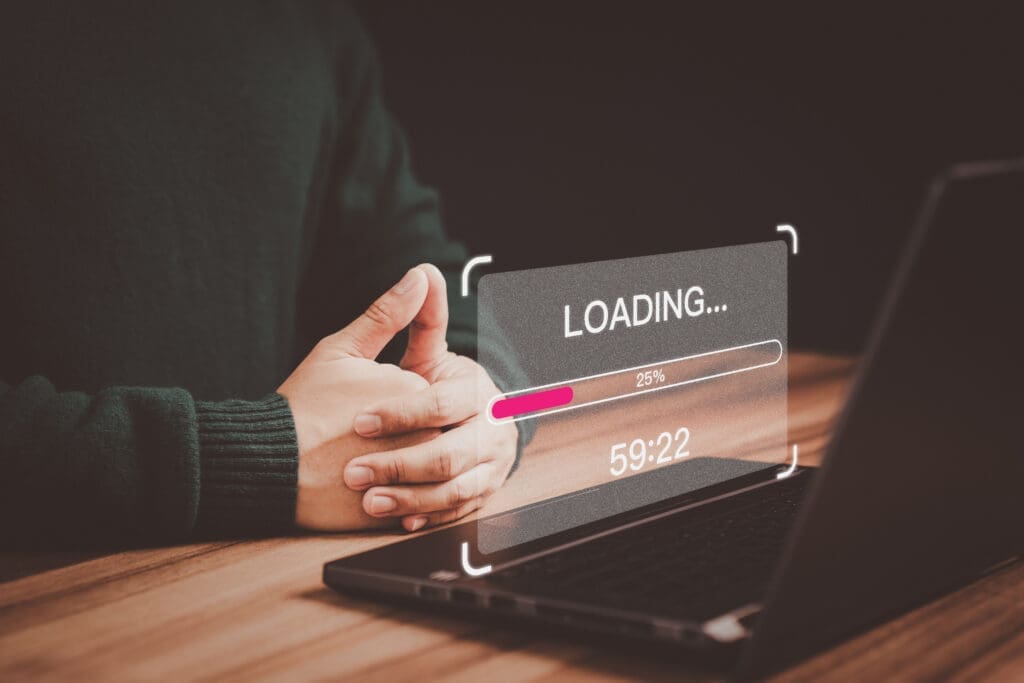Why is My Upload Speed so Slow?
May 15, 2024 | General, Residential
Are you frustrated by slow upload speeds on your home internet? If so, you’re not alone. For a long time, most home internet users didn’t care about upload speeds. In the past, most people relied on the internet for downloads for fast access to viewing web pages and convenient access to online music, books, and videos. Today, however, more residential consumers are using the internet for uploads–from backing up large libraries of digital files to attending online meetings and uploading video content to social media and the web. If you’re dissatisfied with waiting around for your data to send, here are the most common causes that make your upload speed so slow.
Checklist for Diagnosing What’s Making Your Upload Speed So Slow:
There are many reasons your home’s internet upload speeds may be slow. Here is a list of the most common issues that will slow down your home network’s connectivity and make uploads take longer than desired.
- Outdated Router, Modem, or Gateway. The speed of technology transformation is rapid, and just because your equipment seems to be working doesn’t mean it’s working well. These devices that transform the signal coming into your home to your various components (PCs, tablets, smartphones, thermostats, and other wireless devices) usually have a maximum lifespan of five years. After that time, technology has transformed so much that it’s best to replace them. Doing so will ensure they are well-equipped to handle the current internet connection from your internet service provider (ISP.) Make sure you regularly perform firmware updates for these components to keep their software current and secure.
- Outdated WiFi Adapter. At one time, you needed to add a device to give your PC or laptop the ability to connect to your network via WiFi. Today, most laptops and PCs are built with an internal component that does the same. Either way, these components may need to be upgraded for increased performance.
- Too Many Connected Devices. Think about the devices connected to your home network as cars on a highway. The more devices, the more congested the connection becomes, and the slower data will travel. Wireless devices will continue to take up space on this connection highway, even if not in use. Create a routine to review the components connected to your home network and remove devices no longer in use. At the same time, check that no unauthorized users are connected to your home network.
- Using a VPN. As privacy concerns grow, it’s commonplace for people to use a virtual private network (VPN;) A VPN assigns you a unique IP address, encrypts your data, and routes your transmission through their remote servers. If the servers are located far from you, it can take longer for your data to travel back and forth. Switching to another VPN provider with servers located closer to you can increase your upload speeds.
- The Router isn’t Centrally Located. If your network router is located behind walls or too far away from where you are accessing it, the speed can be slow or you may even drop connection with it. Try moving your router to a more centrally located area, or consider a WiFi extender to increase the reach within your home.
- Malware. One of the symptoms a network may be infected with a virus or malware is a slowdown in speed or other interruptions in operation. Ensure you are regularly running virus detection software on your network and using proper passwords and security protocols to limit your risks.
- Your Internet Service Provider. One of the most common causes that makes upload speeds so slow is the ISP. There are more options for ISPs than ever before, so it’s a good idea to review your package to see if it’s the best fit for your needs. Some ISPs will limit your data and throttle (slow down) your speed after you surpass specific levels. Others offer significant download speeds, but upload speeds are much slower. You may need to purchase a different internet package from your provider, or you may need to seek another ISP altogether.
How much internet speed do you need?
The amount of internet speed you need is based on your expected volume of use. Those households with more users, more devices, and greater frequency of use will need more speed than others. You can easily assess your needs using our 30-Second Quiz and learn which package is best suited for your needs. We offer packages for various levels of needs, from casual users to professional gamers and online content publishers.
[button link=”https://hunterfiber.com/30-secondquiz/” type=”icon” color=”red” newwindow=”yes”] How Much Speed Do You Need? 30-Second Quiz[/button]
Hunter Communications will keep you connected.
There’s no reason to struggle with slow upload speeds; our Hunter Communications team is here to help. We feature symmetrical data speeds, so you can rest assured you’ll experience the same fast upload speeds as you do for downloads. And with fiber connectivity, network communications have never been faster. Our experienced team will also help you troubleshoot the components of your home network to identify components that should be replaced or upgraded. With Hunter Communications at your side, you’ll have all the tools and resources you need for seamless connectivity for work or play. Contact us today for more information.

